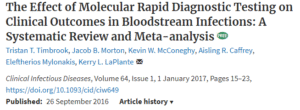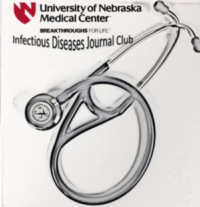Bloodstream infections are associated with high mortality. Blood cultures are a reliable and accurate method for the identification of bloodstream infections but can take up to 5 days or even more being finalized, leading to delays in initiation of effective antibiotic therapy. The Infectious Disease Society of America (IDSA) recommends the use of rapid diagnostic testing with support of antimicrobial stewardship for better clinical outcomes, and President Obama include development of rapid diagnostic tests as one of the five overarching goals of the “National Action Plan for Combating Antibiotic Resistant Bacteria”.
Rapid diagnostic tests in bloodstream infections were discussed at a recent UNMC infectious disease journal club. “The effects of Molecular Rapid Diagnostic Testing on clinical outcomes in Bloodstream Infections systemic review and meta-analysis” published in Clinical Infectious Disease in Jan 2017 was presented by infectious disease fellow Dr. Rajendra Karnatak, with enthusiastic discussion among the group.
Recent advances in rapid diagnostic tests like PCR, Matrix-assisted Laser Desorption/Ionization Time of Flight (MALDI-TOF) Mass Spectrometry, and PNA-FISH have significantly reduced time to identification of microorganisms in bloodstream infections. The effect of molecular rapid diagnostic tests on important clinical outcomes like mortality, time to effective therapy, length of stay, and reduction of treatment cost has not been well established.
 The article Dr. Karnatak reviewed studied the effects of utility of molecular rapid diagnostic tests on mortality, time to effective therapy, and length of stay (LOS). 31 studies met inclusion criteria for systemic review/meta-analysis and 5920 bloodstream infections were studied. All included studies compared conventional microbiological methods to molecular rapid diagnostic tests. Results indicated molecular rapid diagnostics would need to be used 20 times to prevent 1 death within 30-day period, and a statistically significant overall reduction in mortality with use of rapid diagnostics in combination with antimicrobial stewardship (ASP). There was a mean difference of -5.03 hours in time to effective therapy in the molecular rapid diagnostic tests group as compared to conventional microbiological methods. Time to effective therapy was most pronounced in bloodstream infections due to Enterococcus spp. The rapid diagnostic test group demonstrated a shorter LOS by 2.48 days compared to conventional microbiologic methods.
The article Dr. Karnatak reviewed studied the effects of utility of molecular rapid diagnostic tests on mortality, time to effective therapy, and length of stay (LOS). 31 studies met inclusion criteria for systemic review/meta-analysis and 5920 bloodstream infections were studied. All included studies compared conventional microbiological methods to molecular rapid diagnostic tests. Results indicated molecular rapid diagnostics would need to be used 20 times to prevent 1 death within 30-day period, and a statistically significant overall reduction in mortality with use of rapid diagnostics in combination with antimicrobial stewardship (ASP). There was a mean difference of -5.03 hours in time to effective therapy in the molecular rapid diagnostic tests group as compared to conventional microbiological methods. Time to effective therapy was most pronounced in bloodstream infections due to Enterococcus spp. The rapid diagnostic test group demonstrated a shorter LOS by 2.48 days compared to conventional microbiologic methods.
The included enterococcal bloodstream infection study contributed to some heterogeneity of the meta-analysis, with respect time-to-effective therapy. When the enterococcal bloodstream infection study was excluded from analysis, there was only 1.89 hours mean difference in time-to-effective therapy. Without the support of antimicrobial stewardship, results favored mortality benefit with the use of molecular rapid diagnostic tests but failed to demonstrate statistical significance. These findings further support 2016 IDSA recommendations for use of rapid diagnostic tests with support of ASP for better clinical outcome.
 Use of rapid diagnostic tests is one step in a multi-step process that includes appropriate ASP structure, appropriate laboratory notification process, timely intervention and availability of resources for ASP. The majority of studies included in this meta-analysis did not have 24/7 support of ASP. Although this study clearly demonstrated benefit in reduction of LOS, it did not mention overall cost benefit. Molecular rapid diagnostic tests can revolutionize patient care, allowing for initiation of appropriate tailored therapy earlier during the treatment of critically ill patients. ASP and molecular rapid diagnostic tests together can have significant impact on fight against increasing antimicrobial resistance.
Use of rapid diagnostic tests is one step in a multi-step process that includes appropriate ASP structure, appropriate laboratory notification process, timely intervention and availability of resources for ASP. The majority of studies included in this meta-analysis did not have 24/7 support of ASP. Although this study clearly demonstrated benefit in reduction of LOS, it did not mention overall cost benefit. Molecular rapid diagnostic tests can revolutionize patient care, allowing for initiation of appropriate tailored therapy earlier during the treatment of critically ill patients. ASP and molecular rapid diagnostic tests together can have significant impact on fight against increasing antimicrobial resistance.

Content provided by Dr. Rajendra Karnatak, UNMC ID fellow
